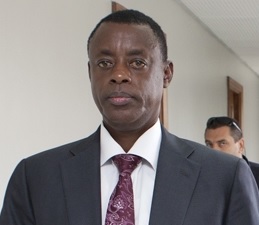Rwanda
RWANDA
Pagina facebook della nazione (Rwanda)
Bernard Makuza
President of the Senate
Sénat, B.P. 6729, KIGALI
(250) 252 594 538, 252 594 500
(250) 252 594 583
info@parliament.gov.rw
Senate website
Donatille Mukabalisa
Speaker of the Chamber of Deputies
Chambre des Députés, B.P. 352, KIGALI
(250) 252 582 894, 252 583 970, 252 586 275
(250) 252 594 793 (Clerk's Office)
info@parliament.gov.rw
Chamber of Deputies website
Capi di stato e Ministri
Ultimo aggiornamento: 10/10/2016| Leader | Nominativo | Bio |
|---|---|---|

|
Paul KAGAME Pres. |
Paul Kagame (/kəˈɡɑːmeɪ/; born 23 October 1957) is the sixth and current President of Rwanda having taken office in 2000 when his predecessor, Pasteur Bizimungu, resigned. Kagame previously commanded the rebel force that ended the 1994 Rwandan Genocide. He was considered Rwanda's de facto leader when he served as Vice President and Minister of Defence from 1994 to 2000. Kagame was born to a Tutsi family in southern Rwanda. When he was two years old, the Rwandan Revolution ended centuries of Tutsi political dominance; his family fled to Uganda, where he spent the rest of his childhood. In the 1980s, Kagame fought in Yoweri Museveni's rebel army, becoming a senior Ugandan army officer after Museveni's military victories carried him to the Ugandan presidency. Kagame joined the Rwandan Patriotic Front (RPF), which invaded Rwanda in 1990; leader Fred Rwigyema died early in the war and Kagame took control. By 1993, the RPF controlled significant territory in Rwanda and a ceasefire was negotiated. The assassination of Rwandan President Juvénal Habyarimana was the starting point of the genocide, in which Hutu extremists killed an estimated 500,000 to one million Tutsi and moderate Hutu. Kagame resumed the civil war, and ended the genocide with a military victory. During his vice-presidency, Kagame controlled the national army and maintained law and order, while other officials began rebuilding the country. Many RPF soldiers carried out retribution killings; it is disputed whether Kagame organised these, or was powerless to stop them. Hutu refugee camps formed in Zaire and other countries, which were controlled by the genocidaires (participants in the genocide) and threatened Rwanda's security. The RPF indiscriminately attacked the camps in 1996, forcing many refugees to return home, but insurgents continued to attack Rwanda. The attack on the refugee camps killed an estimated 200,000 people. As part of the invasion, Kagame sponsored two controversial rebel wars in Zaire. The Rwandan- and Ugandan-backed rebels won the first war (1996–97), installing Laurent-Désiré Kabila as president in place of dictator Mobutu and renaming the country as the Democratic Republic of the Congo (DRC). The second war was launched in 1998 against Kabila, and later his son Joseph, following the DRC government's expulsion of Rwandan and Ugandan military forces from the country. The war escalated into a continent-wide conflict which lasted until a 2003 peace deal and ceasefire. As president, Kagame has prioritised national development, launching a programme to develop Rwanda as a middle income country by 2020. As of 2013, the country is developing strongly on key indicators, including health care and education; annual growth between 2004 and 2010 averaged 7000800000000000000♠8% per year. Kagame has had mostly good relations with the East African Community and the United States; his relations with France were poor until 2009. Relations with the DRC remain tense despite the 2003 ceasefire; human rights groups and a leaked United Nations report allege Rwandan support for two insurgencies in the country, a charge Kagame denies. Several countries suspended aid payments in 2012 following these allegations. Kagame is popular in Rwanda and with some foreign observers; human rights groups accuse him of political repression. He won an election in 2003, under a new constitution adopted that year, and was elected for a second term in 2010. Paul KAGAME, Wikipedia |

|
Anastase MUREKEZI Prime Min. |
Anastase Murekezi (born June 15, 1952) is a Rwandan politician. He studied in Groupe Scolaire Officiel de Butare (GSOB) and went on to Louvain-La-Neuve University in Belgium to study agriculture. He was the minister of Public service and labor until 23 July 2014 when he was nominated by President Paul Kagame as the Prime Minister of Rwanda. Anastase MUREKEZI, Wikipedia |

|
Geraldine MUKESHIMANA Min. of Agriculture & Animal Resources |
|

|
Stella Ford MUGABO Min. of Cabinet Affairs |
|

|
James KABAREBE Min. of Defense & National Security |
General James Kabarebe (born 1959) is a Rwandan military officer who has served as the Rwandan Minister of Defence since April 2010. He served as a Rwandan Patriotic Army Commander and was an Alliance of Democratic Forces for the Liberation of Congo strategist. James KABAREBE, Wikipedia |

|
Serafine MUKANTABANA Min. of Disaster Management & Refugee Affairs |
|

|
Papias Malimba MUSAFIRI Min. of Education |
|

|
Esperance NYIRASAFARI Min. of Family & Gender |
|

|
Claver GATETE Min. of Finance & Economic Planning |
Claver Gatete (born 23 May 1962) is a Rwandan politician and former ambassador, who currently serves as the Minister of Finance and Economic Planning in the Rwandan government. He has previously served as the Governor of the National Bank of Rwanda and as Rwanda’s ambassador to the United Kingdom, Ireland, and Iceland. Claver GATETE, Wikipedia |

|
Louise MUSHIKIWABO Min. of Foreign Affairs & Regional Cooperation |
Louise Mushikiwabo (born 22 May 1961) is a Rwandan politician who has served as the Minister of Foreign Affairs and Cooperation of Rwanda since 2009. She also serves as Government Spokesperson. She was previously Minister of Information. Her brother, Lando Ndasingwa, was the only Tutsi minister in the last Habyarimana government, but was killed at the beginning of the 1994 genocide. Her sister, Anne-Marie Kantengwa, took over the management of their brother's hotel and restaurant, Chez Lando, after his murder. She is the niece of the distinguished Rwandan scholar and priest Alexis Kagame. Louise MUSHIKIWABO, Wikipedia |

|
Diane GASHUMBA Min. of Health |
|

|
James MUSONI Min. of Infrastructure |
|

|
Johnston BUSINGYE Min. of Justice |
|

|
Francis KABONEKA Min. of Local Govt. |
|

|
Vincent BIRUTA Min. of Natural Resources |
|

|
Judith UWIZEYE Min. of Public Service & Labor |
|

|
Julienne UWACU Min. of Sports & Culture |
|

|
Francois KANIMBA Min. of Trade, Industry, & East African Community Affairs |
|

|
Jean Philbert NSENGIMANA Min. of Youth & Information & Communications Technology |
|

|
Venatina TUGIREYEZU Min. in the Office of the Pres. |
|

|
Fulgence NSENGIYUMVA Min. of State for Agriculture |
|

|
Evode UWIZEYIMANA Min. of State for Constitutional & Legal Affairs |
|

|
Uzziel NDAGIJIMANA Min. of State for Economic Planning |
|

|
Germaine KAMAYIRESE Min. of State for Energy & Water |
|

|
Isaac MUNYAKAZI Min. of State for Primary & Secondary Education |
|

|
Patrick NDIMUBANZI Min. of State for Public Health & Primary Health Care |
|

|
Alvera MUKABARAMBA Min. of State for Social Affairs |
|

|
Vincent MUNYESHAKA Min. of State for Socioeconomic Development |
|

|
Olivier RWAMUKWAYA Min. of State for Technical & Vocational Education & Training |
|

|
Alexis NZAHABWANIMANA Min. of State for Transportation |
|

|
Eugene-Richard GASANA Min. of State in Charge of Cooperation |
|

|
Francis GATARE Chief Executive Officer, Rwanda Development Board |
|

|
Johnston BUSINGYE Attorney Gen. |
|

|
John RWANGOMBWA Governor, National Bank of Rwanda |
John Rwangombwa, is a Rwandan accountant, politician and banker. He is the governor of the National Bank of Rwanda, the central bank and national banking regulator. He was appointed to that position on 25 February 2013. John RWANGOMBWA, Wikipedia |
Alcuni dati statistici della nazione (Rwanda)
10.996.891 abitanti
51 Abitanti per km^2
Superficie di 26.338 Kmq
Capitale dello stato, Kigali
